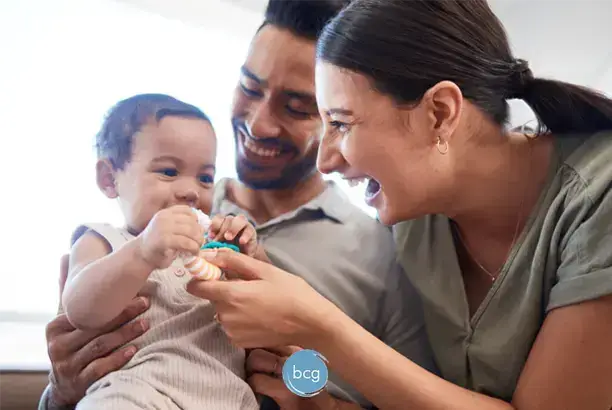Parenting- 8 Tips to Manage Your Stress!
Director, Bach Counselling Group
Parenting can be challenging at the best of times and now, many parents are finding themselves at home, working remotely and attempting to parent and school their children all at the same time!
After 25-years of meditation practice, 20 plus years of providing counselling and coaching and parenting personally, I wanted to offer some tools to help parents grow through these unusual times.
Parenting can be challenging at the best of times and now, many parents are finding themselves at home, working a hybrid model, much of which may be remotely, while attempting to parent their children and manage family life.
I’m hearing parents struggle to manage all of these demands. They are reporting their anxiety is up, their self-care is down and many are troubled .
While any given daily event or life circumstance may cause discomfort, it is our mind that is the cause of our suffering. Armed with stories of the past or worries of the future, our thoughts remove us from the present – often leaving us anxious and much less able to effectively cope with what is currently before us. Gaining awareness of our thoughts and how they influence our state in this new and bizzare reality is key to calming the mind.
Parents are still running – literally…..to get ready for work while preparing the kids for online school, trying to maintain routine at home all while booting up their computer and opening their next zoom meetings. You get the picture….trying to do two jobs at the same time! Being and staying mindful and present is challenging when the, to do list, is simply too long..
Here are 8 tips that will help reduce the stress and set you on your path towards being the mindful, calmer parent you can be
1. Accept what is real.
Whether we like it or not, one human is simply that, only one human. Regardless of the demands being asked of you by work, your partner, your children’s teachers, what are realistic goals to set for yourself, your family, your children? What goals are reasonable/achievable and what goals will result in disappointment in yourself, your children, and your family? Take a moment now to write down some goals and daily tasks for your family that are realistically achievable.
2. Take personal time-outs for yourself.
With a likely hectic house full of kids and working parents, all day long, I had to place personal time-outs near the top of this list. Being willing to recognize that you too may be experiencing added stress is the first step. Next, acknowledge that you and your needs matter in the midst of all of your family demands. Recognize that you have the power to make this decision.
Choosing this amongst the chaos demonstrates to your children the necessity of self-care. Rather than an overextended, tense and distracted parent, your children can witness that self-care is part of healthy Healthy Living. Amid this new reality of the COVID-19, taking mindful breaks to re-center will make a huge difference to helping you be more present when you are with your children.
Even a few minutes alone in a room away from others will have an impact. What about granting yourself alone time daily, where you recharge through quiet and/or an activity you find nourishing? How will you make yourself a priority in the schedule today and plan self care forward this week?
3. Practice being present with your children.
Science consistently shows that relationships with family is a vital source of happiness. So, park your mobile phone on silent, drop the school and work demands and commit 20-30 minutes daily of undivided attention to your children without a task to accomplish. Do a fun activity of their choice, go for a walk or just have a cuddle on the couch. Set the intention to be fully present. That may sound simple, but be patient with yourself if it’s difficult to achieve at first.
4. Allowing the use of devices as a reward to help motivate your children
Science consistently shows that relationships with family is a vital source of happiness. So, park your mobile phone on silent, drop the school and work demands and commit 20-30 minutes daily of undivided attention to your children without a task to accomplish. Do a fun activity of their choice, go for a walk or just have a cuddle on the couch. Set the intention to be fully present. That may sound simple, but be patient with yourself if it’s difficult to achieve at first.
5. Practice gratitude with your kids.
Expressing gratitude is one of the quickest and most powerful ways to feel calm and get present. Model this for your children. At the dinner table each night, have each family member give one example of something they are grateful for that day, no matter how small. This routine takes only a few moments, yet creates connection. It helps the family conversation organize around certainty, what is known, reassuring and which is calming.
6. Explore different ways of being together.…. with your kids.
Meditating together is a great way to help your kids experience the benefits of meditation from an early age. Start with a brief guided meditation, say 5-10 minutes, and expand this together as they grow. The benefits will be long-lasting. And if your kids don’t join you initially, teach through modelling your commitment to a meditation practice daily. We know that modelling is the most powerful teacher for our children anyway!
7. Be aware of how you respond to the world around you.
Demonstrate compassion not only with yourself and your children, but also with the world around you. Given all that is currently happening, it’s easy to retract with anxiety and give an anxious message in response to the anxiety all around us. Choose to practice the safe rules science has given us for COVID-19 and ensure yourself and your family what can be controlled based on this information. Others may be in highly reactive states, when you do go for a shop or a walk. Breath and look to understand while demonstrating patience and calm to your children. Modelling and practicing compassion will help your children develop a calmer response to any given circumstance they encounter.
8. Self-care, again.
Okay a second reminder about self-care because it matters this much! As parents, it’s easy to be distracted from our own needs due to the many responsibilities we have for others, especially at a time when the demands on us have dramatically risen. As a result, it’s easy to forget to schedule our own self-care. Many of us even feel guilty when we try to take time to do the things that we enjoy. Recognize that self-care creates “a healthier, happier you” which in turn results in you being a more effective, healthier and happier parent. The result? Healthier and happier children and family!
What’s next?
Take a look back over these 7 easy tips and commit to a few at first. During this strange new norm we find ourselves in, we need to choose to control those things that are reasonable, realistic and that allow for time to connect and enjoy ourselves and our families. Be kind to yourself first because you are under a great deal of stress along with so many others at this time.




